| |

 |
|
CAST COREspondence
The IP Newsletter from CAST, Inc. — February 11, 2025
|
| |
|

2024 was another successful year for CAST, with over 100 new customers licensing cores and
enjoying CAST's Better IP Experience. We also established new partnerships with outstanding
firms, launched several new products, and invested in growing the CAST engineering and sales
teams.
In 2025, that investment will pay off for our customers with new automotive interface cores
(starting with SafeSPI below), security cores (see PQC-KEM below), faster versions of our
networking cores, Functional Safety ISO-26262 certification for additional cores, and other
competitive new products in several areas.
Watch for new product announcements starting soon, and stop by to talk at upcoming events
(listed down below). Or let us know which cores might help you have a successful 2025.
— Nikos Zervas, CEO

|
Since the 1980s, the de facto Serial Peripheral Interface
(SPI) standard has proven quite effective, especially in
automotive systems where it typically links sensors with
processors. Now this new core lets you retain the
benefits of conventional SPI while gaining modern
interoperability features and also addressing the growing
requirement for automotive Functional Safety.
The new SafeSPI-CTRL SafeSPI Controller Core implements
the Serial Peripheral Interface for Automotive Safety
|
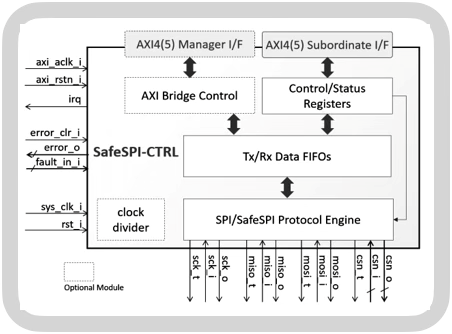 |
(SafeSPI), a formal industry standard developed and
maintained by the SafeSPI Organization. This standard makes communication consistent, meaning
the new core can work with any other SafeSPI-compliant devices (as well as older SPI devices).
Most significantly, the SafeSPI protocol addresses Functional Safety by incorporating Cyclic
Redundancy Check (CRC) for detecting errors in data
|
transmission command and response frames,
strict handshaking mechanisms, and fault detection
procedures.
Furthermore, the core internally employs modular
redundancy, parity, and ECC to protect register files and
memories and ensure compliance with the most stringent
functional safety requirements. We believe it is the first
such IP core, being fully featured and SafeSPI
2.0-compliant, ready for ASICs or FPGAs, and having the
|
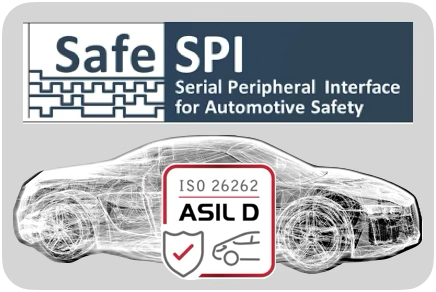 |
features required for ISO 26262 ASIL-D Functional Safety
certification. Compliments to our development partner, Silesia Devices.
See more benefits in our press release, tech details on our product page, or just contact sales to
start adding Functional Safety to your SPI connections today. |
| |
|
| |
|

As quantum mechanics-based computers emerge,
cryptography researchers are working to develop
encryption and security solutions that can withstand the
tremendous power of these new machines. Through our
partnership with classical and post-quantum
cryptographic (PQC) solutions developer KiviCore, we
|
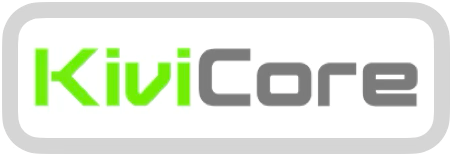
|
| will soon ship CAST-quality IP cores that help you address these challenges. |
| |
Expected soon is the KiviPQC™-KEM core, a self-contained hardware/software codesign that
implements the Module-Lattice Key Encapsulation Mechanism specified in the NIST FIPS 203
standard. It efficiently handles secret key generation, encapsulation, and decapsulation,
enabling symmetric-key cryptographic algorithms to perform secure communication tasks such
as authentication, data integrity verification, and encryption/decryption.
|
“We have managed to implement the secure key management functions
needed for the post-quantum computing era in a high-quality IP core with
a focus on resource efficiency, simplicity, and seamless integration. One
of the earliest such IP cores available — and we believe the most reliable
yet flexible — this is the first in our KiviPQC series that will dramatically
simplify cryptographic system development in many fields.”
|

|
— Frank Deicke, KiviCore co-founder
The new core enables secure connections with the MACSec and CANSec cores we already
offer, as well as IPSec, Transport Layer Security (TLS), and many other protocols. Watch for
more details in the product announcement coming soon, or early adopters can contact us now
(info@cast-inc.com) to evaluate the KiviPQC-KEM core using a readily available FPGA-based
reference design.
|

Lossless data compression yields smaller data files or
streams while ensuring that the original data can be
fully and perfectly reconstructed. It is essential for
applications demanding maximum data fidelity and
helps reduce huge data volumes, optimize storage and
bandwidth, reduce network latency, and save energy.
While the importance of lossless data compression is
clear, how to choose the best of several algorithms —
and then the best IP core for efficiently implementing
that algorithm in hardware — is less so. Our Dr.
Calliope-Louisa Sotiropoulou shed light on this with a
comparison study she reported at December’s Design
and Reuse IP-SoC Day in Grenoble.
|
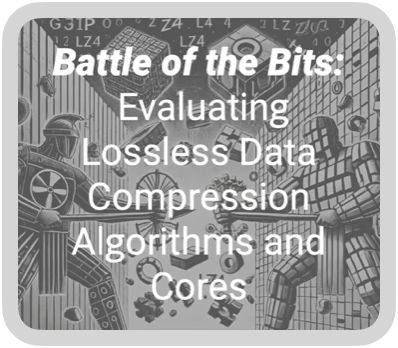
|
Using a standard set of representative data files, she
compared the compression ratio and speed and the
computational complexity of popular algorithms GZIP,
LZ4, Snappy, and Zstd. Check out her findings in
this Battle of the Bits presentation. Spoiler alert: the
best choice depends on the data and your system
requirements, but there are smart strategies you can
employ. See our Lossless Data Compression IP Cores,
watch D&R’s Gabrielle Saucier interview Dr. Sotiropoulou
in this video, and feel free to contact Dr. Sotiropoulou to
learn more.
|

|

With its fast deterministic communication, Time
Sensitive Networking (TSN) is rapidly reshaping
system architectures in automotive, aerospace, and
other domains. Working with our partner Fraunhofer
IPMS — a TSN pioneer — our TSN cores date back to
2018. Having gone through multiple industry
plugfests and numerous customer deployments these
are probably the most proven such IP cores available.
We currently offer:
• A multiport, layer-2, cut-through
TSN Ethernet Switch,
|
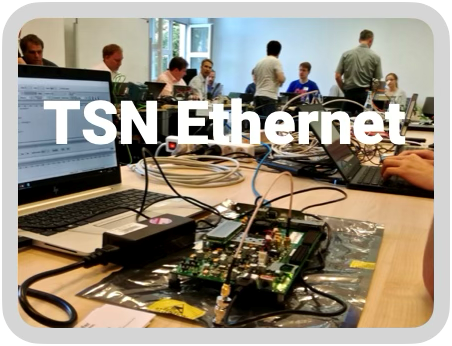
|
• A TSN Ethernet Endpoint suitable for star network topologies, and
• A TSN Ethernet Switched Endpoint suitable for daisy-chained networks.
These achieve highly accurate timing synchronization, schedule traffic with minimum latency, are
technology-agnostic, and use a fraction of the silicon resources of competing IP cores (see
representative results for ASICs and multiple FPGA vendor devices on the linked pages).
|
As part of our decades-long partnerships with each of
the FPGA vendors, we were recently invited to
participate in the Lattice Developer’s Conference. There
our Alex Mozgovenko and Evan Price presented a live
demo of our TSN Ethernet Endpoint core running on a
Lattice CertusPro™ -NX platform board along with the
Functional Safety RISC-V EMSA5-FS processor we offer.
The demo showed accurate timing synchronization between
networked devices (802.1AS); flexible traffic shaping
|
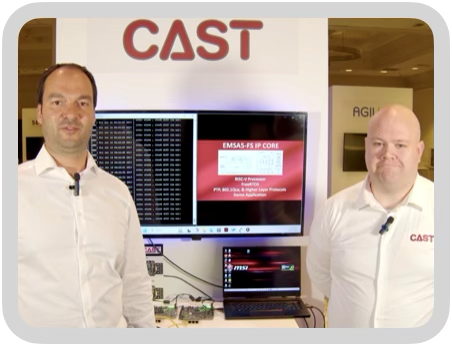 |
(8021.Qav & 802.1Qbc) with pre-emption support (802.Qbu & 802.3br); and optional redundancy
(802.1CB) and path control & reservation (802.1Qca). Watch the video on the Lattice DevCon site
then contact Alex with any questions. |
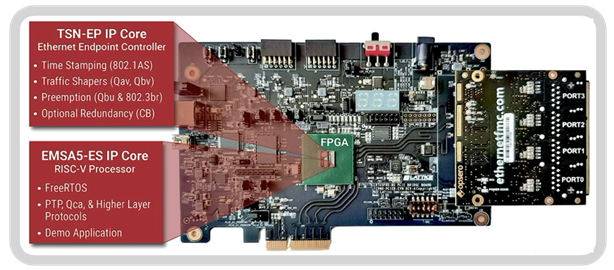

The busy conference and trade show season is ramping up. Let's meet and talk if you’re attending
any of these March or April events.
First up is Embedded World in Nuremberg, Germany,
March 11–14, 2025. We’ll be introducing some
exciting new IP products, including — surprise! —
an important new version of the 40-year-old 8051 MCU.
Stop by booth 4-569.
|

|
Right after Embedded World we'll be discussing mission-
critical IP cores at GOMACTech in Pasadena, California,
March 17-20, 2025. Last year was our first there, and
we found that the high-quality, low-risk IP we offer
resonated with that very discerning defense and military
systems audience.
|
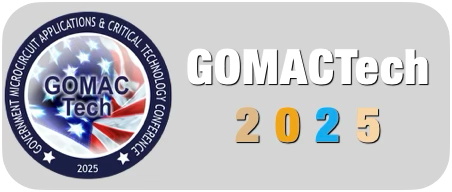
|
In April, we catch up with Silicon Valley customers,
partners, and friends at the Design and Reuse IP-SoC
Days in Santa Clara, California, April 25–26, 2025. We
expect to have some more new product announcements
at that event, so stop by if you are attending and be the
first to hear the latest.
|
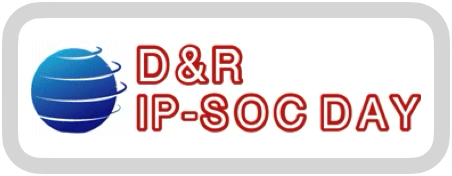
|
| |
|
Copyright © 2025 CAST: Computer Aided Software Technologies, Inc., All rights reserved.
|
|
